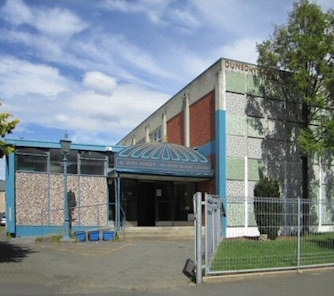- Introduction To Islam
- NZ Muslims' Declaration
- Understanding Islam & Muslims
- The Five Pillars
- Muslim Dress
- Before You Read The Qur'an
- The Concept of God
- The Concept of Worship
- The Centrality of Compassion In Islam
- Mosques Of Europe
- Muslim Thinkers
- Women In Islam
- Religion Of Truth
- Life After Death
- Glossary of Islamic Terms
- Islamic Calendar
- InterFaith
- Search
- Links
- Home
- Prayer & Dua
- Education & Dawah
- Islam In New Zealand
- NZ Muslims' Declaration
- NZ Masajid, Islamic Centres & Prayer Room Facilities
- Islamic Women's Council of New Zealand
- The NZ Muslim Community [2009 - perspective]
- Muslims In New Zealand [1999 - a historic perspective]
- FIANZ - The Federation of Islamic Associations of New Zealand
- FIANZ New Zealand Halal Directory
- Local Halal Food Outlets
- Search
- Links
- Home
- Home



New Zealand Muslims are ethnically diverse, tracing their origins to more than forty countries, including many second, and third generation, New Zealand born Muslims, Maori and Pakeha. The New Zealand Muslim community is small relative to Muslim communities in other Western nations such as the USA, France, Britain, and Germany.1
Like all early populations in New Zealand the Muslim community was initially comprised entirely of immigrants. New Zealand's first Muslim immigrants were fifteen Chinese gold diggers working in Dunstan, in the South Island, recorded in the government census of April 1874. In the 1890s several Indian Muslim men migrated to the North Island and in the 1900s another three Muslim men arrived from the Indian state of Gujarat. These were soon followed by further Indian Gujaratis and Punjabis immigrants.2

Mosques across New Zealand
By 1950 the Muslim population of New Zealand was recorded at one hundred and fifty, which was complimented in 1951 by the arrival of a boatload of European refugees including about 60 Muslim men from Albania, Bulgaria and Yugoslavia. Most went to Auckland where the resident Indian Muslim population helped them settle into their new homeland. By 1961, there were 260 Muslims in New Zealand according to the government census.
The 1960s saw the arrival of the first Asian students who were followed in the 1970s by an influx of Indo-Fijians (including a number of Muslims) the majority of whom settled in Auckland.
From the 1970s until the present day there's been a steady trickle of Maori and Pakeha converts to Islam and the continuing expansion of the New Zealand born Muslim population. Over the following twenty years the New Zealand census indicates more than a seven-fold increase, and, further, the numbers trebled in each succeeding decade. A considerable number of Muslims of Indian origin came from Fiji some to study and more to work in shops or industry. Today this is the largest group of Muslims in New Zealand and is represented across all regions.
As with the earlier Indian arrivals and later immigrants, most maintain close contacts with their relatives elsewhere. Gujaratis comprise perhaps thirty to forty percent of the Auckland community today. A small number of professional and white-collar workers settled in New Zealand from several Muslim countries after the later part of the 1960s. These are more concentrated in the Wellington community.
In the 1990s Somali refugees and Middle Eastern immigrants began settling in the main cities along with a large increase in overseas students, including upper level secondary student, university undergraduates and graduate students, and some professionals in specialist courses, who stayed in New Zealand for periods varying between two to six years. Many of these students are active in local Muslim communities while here and New Zealand Muslims feel a clear responsibility to ensure their New Zealand experience is as positive as possible.
According to the 2006 census figures there are 37,000 Muslims resident in New Zealand from various ethnic backgrounds, a significant proportion of whom are New Zealand born, including about 4000 that identify as Pakeha and Maori. The community makes up 0.9% of the total New Zealand population of four million.
Geographically New Zealand Muslims are predominantly urban, with the largest number in Auckland and smaller concentrations in Wellington Christchurch, Hamilton, Dunedin, Hastings, Tauranga, New Plymouth, Hawera, Whangarei and Palmerston North. The majority of wage/salary earners are "blue-collar" workers and small business owner/operators, along with a significant group of university-trained professionals and government employees.
In recent years the New Zealand government has issued State Honours to a number of eminent New Zealand Muslims in recognition of their services to the New Zealand Muslim community. These include: Haji Mazhar S. Krasniqi (Queen's Service Medal QSM ), the first FIANZ president; Dr Haji Ashraf Choudhary (Companion of the Queen's Service Order QSO ), a former FIANZ president; Dr Haji Khalid R. Sandhu (QSO), a former FIANZ president; Haji Abdul Rahim Rasheed (QSO) a former FIANZ president; Dr Haji Anisur Rahman (QSO); and Dr Haji Anwar Ghani (Member of The New Zealand Order of Merit MNZM ) a former FIANZ president.
Extract from FIANZ Profile published July 2009 [Reprinted with permission].
1 Back Kolig, E. (2003). An Accord of Cautious Distance: Muslims in New Zealand, Ethnic Relations and Image Management. New Zealand Journal of Asian Studies 5, 24-50.
2 Back Drury, A. (2000). A Short History of Ponsonby Mosque, New Zealand. Al- Nahdah, Vol.19, No.3, pp.36-38
